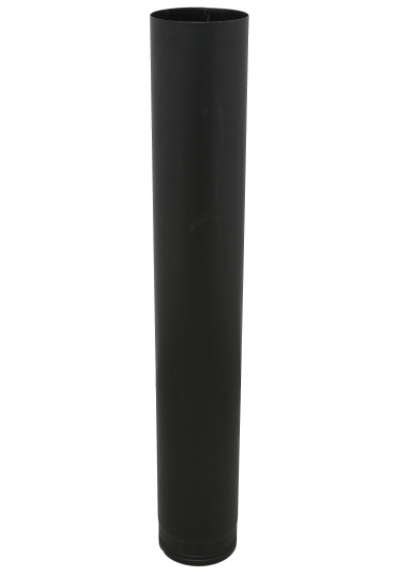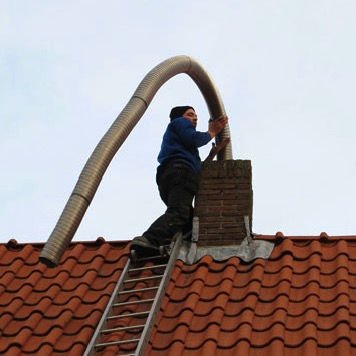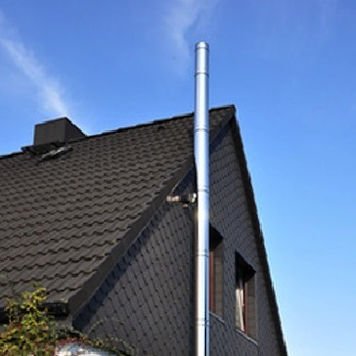Choose your Kit for Wood and multi-fuel Stoves
Chimney flues and flue pipes online
We are Europe's biggest website specialising in chimney liners and twin wall isolated pipes. We guarantee high quality for a reasonable price. We gladly help you choose the necessary component and, if something goes wrong, we will help you solve the issue!
Our double wall insulated flue pipes are of course HETAS approved and have the T600 European certificate. We also supply single wall pipes, flue pipes, black stove pipes and chimney liners.
We supply a full range of chimney systems, all delivered from our 3 warehouses in the UK.
Our twin wall flues are supplied with the necessary locking bands free of charge!
Building regulations Self installation
About our Chimney flues and Flue pipes
All flues are made of stainless steel. For twin wall flue pipes, ceramic wool of the highest quality is used as insulation material. Every product you find on our website is designed for the evacuation of gases and renovation of existing chimney pipes. Our products can be used for gas, coal or wood stoves, pellet ovens or oil heaters. Our flues can be used inside and outside the house.
Flues at flue-pipes.com
- Expert advice
- Good quality
- Best prices
- Excellent after-sales support.
- Free locking bands
Buy your flexible chimney liner online

Installing a stainless steel chimney liner is an easy and economical way to repair an unsafe, deteriorated, or inefficient chimney. You will know how to install a chimney liner after reading our instructions (see Fitting a flexible liner) and you can do the job with regular household tools.
A flexible flue liner should be installed to reduce the chance of a carbon monoxide leak, chimney fire, and creosote build-up. A chimney liner also improves the energy efficiency of the appliance and makes fireplace maintenance easier.
Have you checked our large range of flues and made your selection? You can easily order your chimney liner via our web shop. If you have a question, please contact us for specialist advice by phone or email.
We have been supplying chimney linings for well over 10 years. We can advise you on what flexible lining system is best for your situation and supply all the materials you will need for the job. All the flexible liners and lining systems come with a 15 or 30-year warranty.

Single wall pipes
We supply single-wall pipes in two styles. We offer a black enamel flue pipe in a standard matt finish. Stainless steel flue pipes can also be used inside an existing chimney. Whether you decide on our black enamel or stainless steel flue pipes, they fit easily together.
Our stove pipe is a matt black, single-wall stove pipe. Its enameled interior and exterior ensure the durability of the colour and increases its resistance to high temperatures and condensation. At 1 mm steel thickness, it can be easily cut to the required size using fine-grain grinding disks.
The single wall flue pipe is the standard for venting heating stoves. A black stovepipe is used to vent the stoves exhaust out of the living space and into a chimney liner or chimney system. This is commonly called a "connector pipe".
Suitable for use as a stove connection to chimney or liner, for domestic and commercial heating appliances.
Twin wall flues for new chimneys

A twin wall flue system allows a stove to be installed practically anywhere in the house. Whether it's in an existing property or a new house, an isolated twin wall flue pipe lets you install a new chimney that is safe, effective and easy to fit.
If you are installing a new heating appliance, such as a wood-burning stove, gas coal-effect fire or an oil boiler, you will probably need an insulated flue system, you certainly will if you do not have a brick chimney stack. Twin wall systems can be constructed to produce a safe chimney system for your appliance.
Twin wall flue pipes are suitable for the creation of both indoor and outdoor flues and they can be used to pass through roofs and floors. Our double wall flues are suitable for use with wood, coal, gas and oil appliances. Our Twin wall flue system is also perfect for biomass boiler installations.
For twin wall pipes, ceramic wool of the highest quality is used as insulation material.
Our pipes are supplied with the necessary locking bands free of charge!
Our best selling products
Chimney linerTwin wall flueBlack stove pipe
Frequently asked questions
-
What is the difference between a chimney and a flue?
Europes biggest flues webstore specialised in chimney flue liners and twin wall flues. Lowest price guarantee
Lowest price guarantee  30 year warrantee
30 year warrantee  Professional advice
Professional advice  Select and order your chimney liner here.
Select and order your chimney liner here.Flues are a channel, pipe, or tube through which gases and smoke travel from the fireplace to the outside. A chimney is, on the other hand, in its simplest definition, the housing that encases the flue.
There’s a misconception that masonry chimneys are simply made of brick. This isn’t true. The uneven and porous surface of brick provides a space for combustion byproducts to accumulate. This is a major fire hazard. Therefor chimneys are lined with a flue, so the smoke passes over a smooth surface that helps prevent excessive accumulation of combustion byproducts and minimizes the chance of fire. -
What does open flue mean?
An open flue typically consists of a pipe to carry combustion gases from the fireplace, whilst fresh air enters the fireplace via the casing. So for safe operation, additional air vents are required in the room where the appliance is installed to re-supply fresh air.
-
Does a chimney need a liner?
If you are installing a chimney in a new build property and you want to use it for an open fire, wood burning stove or gas fire, then the chimney does need to be lined to comply with document J of current building regulations. In an older property, your chimney doesn’t have to be lined to meet building regulations. An inspection by a chimney professional will tell you if you need to have it lined for safety purposes.
-
How does a chimney work?
Chimneys operate on the principle that hot air rises above cold air. Hot exhaust gases and ash are lighter weight than the cold outdoor air. The flue directs exhaust these lighter gases from a fireplace upward to vent outdoors into the atmosphere. Additional air vents are required in the room where the appliance is installed to re-supply fresh air.
* Conditions apply










